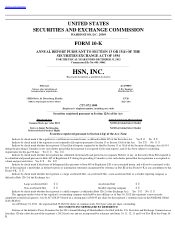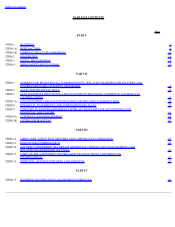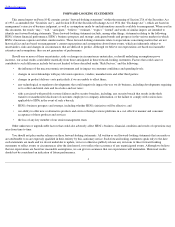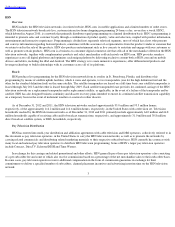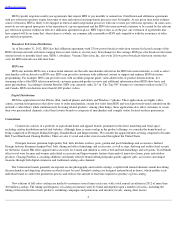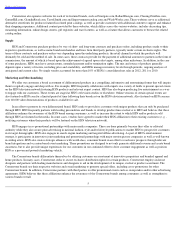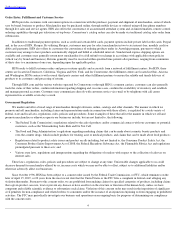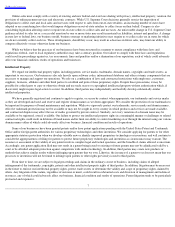Home Shopping Network 2012 Annual Report Download - page 11
Download and view the complete annual report
Please find page 11 of the 2012 Home Shopping Network annual report below. You can navigate through the pages in the report by either clicking on the pages listed below, or by using the keyword search tool below to find specific information within the annual report.
Table of Contents
Online sales must comply with a variety of existing and new federal and state laws dealing with privacy, intellectual property, taxation, the
provision of online payment services and electronic contracts. While U.S. Supreme Court decisions generally restrict the imposition of
obligations to collect state and local sales and use taxes with respect to sales from out-of-state retailers, an increasing number of states have
adopted or are considering laws that would impose obligations on out-of-state retailers to collect taxes on their behalf. Congress is also
considering legislation allowing states to require out-of-
state sellers to collect sales and use taxes. An unfavorable change in U.S. Supreme Court
guidance related to sales tax or a successful assertion by one or more states may result in material tax liabilities, interest and penalties. A change
in state law or federal laws, our business model, business strategy or marketing initiatives may require us to collect sales tax in states for which
we do not currently collect such tax. These developments, should they occur, may result in a decrease in future sales, may limit our ability to
compete effectively or may otherwise harm our business.
While we believe that the practices of our businesses have been structured in a manner to ensure compliance with these laws and
regulations; federal, state or local regulatory authorities may take a contrary position. Our failure to comply with these laws and regulations
could result in proceedings against us, tax assessments, fines and penalties and/or a diminution of our reputation, each of which could adversely
affect our financial condition, results of operations and businesses.
Intellectual Property
We regard our intellectual property rights, including patents, service marks, trademarks, domain names, copyrights and trade secrets, as
important to our success. Our businesses also rely heavily upon software codes, informational databases and other systemic components that are
necessary to manage and support our operations. We rely on a combination of laws and contractual restrictions with employees, customers,
suppliers, licensees, affiliates and other third parties to establish and protect these proprietary rights. Despite these precautions, it may be
possible for a third party to copy or otherwise obtain and use trade secrets or copyrighted intellectual property without authorization which, if
discovered, might require legal action to correct. In addition, third parties may independently and lawfully develop substantially similar
intellectual properties.
We have generally registered and continue to apply to register, or secure by contract when appropriate, our trademarks and service marks
as they are developed and used, and reserve and register domain names as we deem appropriate. We consider the protection of our trademarks to
be important for purposes of brand maintenance and reputation. While we vigorously protect our trademarks, service marks and domain names,
effective trademark protection may not be available or may not be sought in every country in which products and services are made available,
and contractual disputes may affect the use of marks governed by private contract. Similarly, not every variation of a domain name may be
available or be registered, even if available. Our failure to protect our intellectual property rights in a meaningful manner or challenges to related
contractual rights could result in dilution of brand names and/or limit our ability to control marketing on or through the internet using our various
domain names either of which could adversely affect our business, financial condition and results of operations.
Some of our businesses have been granted patents and/or have patent applications pending with the United States Patent and Trademark
Office and/or foreign patent authorities for various proprietary technologies and other inventions. We consider applying for patents or for other
appropriate statutory protection when we develop valuable new or identify improved proprietary technologies or inventions, and will continue to
consider the appropriateness of filing for patents to protect future proprietary technologies and inventions as circumstances may warrant. The
issuance or assessment of the validity of any patent involves complex legal and factual questions, and the breadth of claims allowed is uncertain.
Accordingly, any patent application filed may not result in a patent being issued or existing or future patents may not be adjudicated valid by a
court or be afforded adequate protection against competitors with similar technology. In addition, third parties may create new products or
methods that achieve similar results without infringing upon patents that we own. Likewise, the issuance of a patent to us does not mean that our
processes or inventions will not be found to infringe upon patents or other rights previously issued to third parties.
From time to time, we are subject to legal proceedings and claims in the ordinary course of business, including claims of alleged
infringement of the trademarks, copyrights, patents and other intellectual property rights of third parties. In addition, litigation may be necessary
in the future to enforce our intellectual property rights, protect trade secrets or determine the validity and scope of proprietary rights claimed by
others. Any litigation of this nature, regardless of outcome or merit, could result in substantial costs and diversion of management and technical
resources, any of which could adversely affect our business, financial condition and results of operations. Patent litigation tends to be particularly
protracted and expensive.
7


